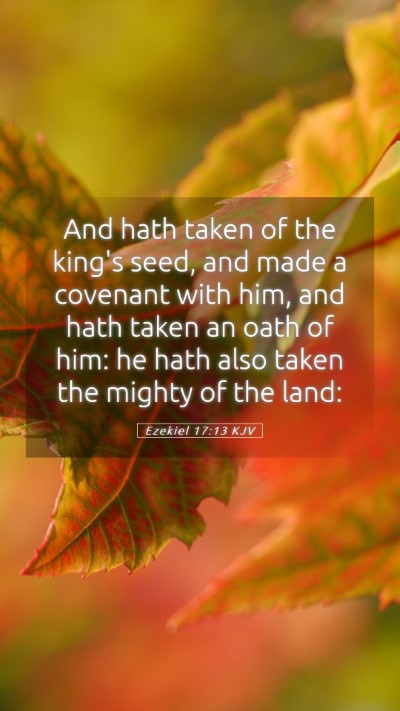Bible Verse Meaning: Ezekiel 17:13
Verse: "And hath taken of the king's seed, and made a covenant with him, and hath taken an oath of him: he hath also taken the mighty of the land." (Ezekiel 17:13)
In understanding Ezekiel 17:13, one must delve into the historical and prophetic context of the scripture. This verse is part of a parable given by God to Ezekiel regarding the fate of Israel and its leaders. It draws from important themes of covenant, loyalty, and the consequences of disobedience, providing rich insights into the meanings of Bible verses.
Summary of Insights from Public Domain Commentaries
This verse serves as a reminder of God's sovereignty and the covenant relationship He has with His people. Significant insights can be gathered from various respected commentaries:
-
Matthew Henry:
Henry emphasizes the importance of the "king's seed," highlighting the divine selection of leadership and the responsibility that comes with it. The taking of an oath symbolizes the binding agreement between the leader and the people, reflecting upon the trials and accountability faced by those in authority.
-
Albert Barnes:
Barnes points out the metaphor contained within this passage, indicating that the "king's seed" symbolizes hope for Israel's restoration. The covenant made represents God's promise to sustain and guide His people, signifying that leadership must align with divine purpose to ensure their welfare.
-
Adam Clarke:
Clarke addresses the political backdrop of the time, discussing the implications of the covenant made with a foreign leader, which illustrates the turning away from God. He notes how reliance on human alliances rather than trust in God leads to disaster, reinforcing the prophetic warnings given through Ezekiel.
Understanding Scripture: Theological and Historical Context
This verse is situated in a time of exile for the Israelites, serving as a reminder that God's plans include restoration. The alliance and covenant outlined in the text signify not just political maneuvering, but also divine providence. The analysis of this scripture can deepen one’s understanding of God’s broader narrative for Israel, encouraging Bible study insights and enriching religious discussions.
Key Themes in Ezekiel 17:13
- Covenant: The commitment made between God and His people is foundational to understanding Scripture.
- Leadership: Emphasizing the role of leaders as representatives of God's will and their moral obligations.
- Divine Sovereignty: Acknowledging God's control over the affairs of nations and the unfolding plan for Israel.
- Judgment and Hope: The dual nature of the passage reflects both the imminent judgment for disobedience and the hope of redemption.
Application of Biblical Principles
In applying the truths of Ezekiel 17:13 to daily life, readers can explore ways to understand and interpret Bible verses through personal reflection and community study. Emphasizing the importance of covenantal relationships in one’s life can yield profound insights into personal faithfulness and accountability.
Additional Bible Cross References
- Ezekiel 11:17: A promise of restoration for Israel’s exiles.
- Isaiah 53:2: The significance of the root out of dry ground, highlighting hope in despair.
- Jeremiah 31:31: New covenant promise, linking to the theme of divine faithfulness.
Conclusion
By engaging with Ezekiel 17:13 through thoughtful scripture analysis and commentary, believers can enhance their biblical exegesis and group discussions in bible study groups. This exploration not only leads to personal insights but also strengthens communal faith as individuals apply these teachings in their lives. In understanding difficult Bible passages, one finds that historical context and prophetic literature are critical to grasping the broader message of God's relationship with humanity.


